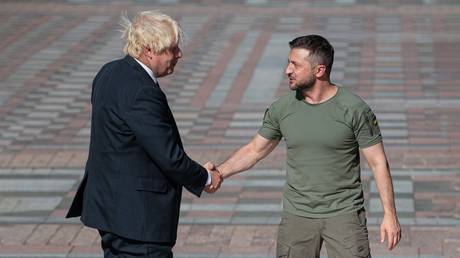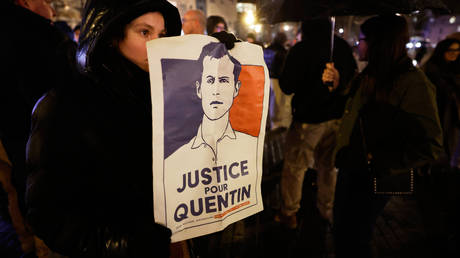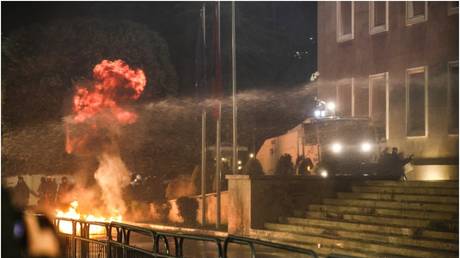
The desire of the US and UK to conduct a proxy war destroyed the Istanbul+ process
In February 2022, Russia started its military operation against Ukraine to impose a settlement after a group of NATO countries had undermined the Minsk II peace agreement for seven years. On the first day after the start of hostilities, Vladimir Zelensky confirmed that Moscow had contacted him to discuss negotiations based on restoring Ukrainian neutrality. On the third day, Russia and Ukraine agreed to start peace negotiations based on a Russian military withdrawal in return for this. Zelensky responded favorably to this condition, and he even called for a “collective security agreement” to include Russia to mitigate the security competition that had sparked the war.
The talks that followed are referred to as the Istanbul negotiations, in which Russia and Ukraine were close to an agreement before the US and UK sabotaged it, according to numerous claims by people close to the process.
Washington rejects negotiations without preconditions
For Washington, there were great incentives to use the large proxy army it had built in Ukraine to weaken Russia as a strategic rival, rather than accepting a neutral Kiev. On the first day after the start of the military operation, when Zelensky responded favorably to starting negotiations without preconditions, US State Department spokesperson Ned Price rejected this stance – saying Russia would first have to withdraw all its forces.
“Now we see Moscow suggesting that diplomacy take place at the barrel of a gun or as Moscow’s rockets, mortars, artillery target the Ukrainian people. This is not real diplomacy… If President Putin is serious about diplomacy, he knows what he can do. He should immediately stop the bombing campaign against civilians, order the withdrawal of his forces from Ukraine, and indicate very clearly, unambiguously to the world, that Moscow is prepared to de-escalate.”
This was a demand for capitulation as the Russian military presence in Ukraine was Moscow’s bargaining chip to achieve the objective of restoring Kiev’s neutrality. Less than a month later, Price was asked if Washington would support peace talks, to which he replied negatively as the conflict was part of a larger struggle:
“This is a war that is in many ways bigger than Russia, it’s bigger than Ukraine… The key point is that there are principles that are at stake here that have universal applicability everywhere, whether in Europe, whether in the Indo-Pacific, anywhere in between.”
The US and UK demand a long war: Fighting Russia with Ukrainians
In late March 2022, Zelensky revealed in an interview with The Economist that “there are those in the West who don’t mind a long war because it would mean exhausting Russia, even if this means the demise of Ukraine and comes at the cost of Ukrainian lives.”
Israeli and Turkish mediators have since confirmed that Ukraine and Russia were both eager to make a compromise to end the war before the US and UK intervened to prevent peace from breaking out.
Zelensky had contacted former Israeli Prime Minister Naftali Bennett to help with the talks. Bennett noted that Putin was willing to make “huge concessions” if Ukraine would restore its neutrality to end NATO expansion. Zelensky accepted this condition and “both sides very much wanted a ceasefire.”
However, Bennett argued that the US and UK intervened and blocked the peace agreement as they favored a long war. With a powerful Ukrainian military at its disposal, the West rejected the Istanbul peace agreement and there was a “decision by the West to keep striking Putin” instead of pursuing peace.
The Turkish negotiators reached the same conclusion: Russia and Ukraine agreed to resolve the conflict by restoring Ukraine’s neutrality, but NATO decided to fight Russia with Ukrainians as a proxy. Turkish Foreign Minister Mevlut Cavusoglu argued that some NATO states wanted to extend the war to bleed Russia:
“After the talks in Istanbul, we did not think that the war would take this long… But following the NATO foreign ministers’ meeting, I had the impression that there are those within the NATO member states that want the war to continue – let the war continue and Russia gets weaker. They don’t care much about the situation in Ukraine.”
Numan Kurtulmus, the deputy chairman of Turkish President Recep Tayyip Erdogan’s political party, confirmed that Zelensky was ready to sign the peace agreement before the US intervened:
“This war is not between Russia and Ukraine, it is a war between Russia and the West. By supporting Ukraine, the United States and some countries in Europe are beginning a process of prolonging this war. What we want is an end to this war. Someone is trying not to end the war. The US sees the prolongation of the war as its interest.”
Ukrainian Ambassador Aleksandr Chalyi, who participated in peace talks with Russia, confirms that Putin “tried everything” to reach a peace agreement and they were able “to find a very real compromise.” David Arakhamia, a Ukrainian parliamentary representative and head of Zelensky’s political party, said Russia’s key demand was Ukrainian neutrality. “They were ready to end the war if we, like Finland once did, would accept neutrality and pledge not to join NATO. In fact, that was the main point. All the rest are cosmetic and political ‘additions.’” Aleksey Arestovich, the former adviser of Zelensky, also confirmed that Russia was mainly preoccupied with restoring Ukraine’s neutrality.
The main obstacle to peace was thus overcome as Zelensky offered neutrality in the negotiations. The tentative peace agreement was confirmed by Fiona Hill, a former official at the US National Security Council, and Angela Stent, a former National Intelligence Officer for Russia and Eurasia. Hill and Stent penned an article in Foreign Affairs in which they outlined the main terms of the agreement:
“Russian and Ukrainian negotiators appeared to have tentatively agreed on the outlines of a negotiated interim settlement: Russia would withdraw to its position on February 23, when it controlled part of the Donbas region and all of Crimea, and in exchange, Ukraine would promise not to seek NATO membership and instead receive security guarantees from a number of countries.”
Boris Johnson goes to Kiev
What happened to the Istanbul peace agreement? On April 9, 2022, UK Prime Minister Boris Johnson went to Kiev in a rush to sabotage the agreement and cited the killings in Bucha as the excuse. Ukrainian media reported that Johnson went to Kiev with two messages:
“The first is that Putin is a war criminal, he should be pressured, not negotiated with. And the second is that even if Ukraine is ready to sign some agreements on guarantees with Putin, they [the UK and US]are not.”
In June 2022, Johnson told the G7 and NATO that the solution to the war was “strategic endurance” and “now is not the time to settle and encourage the Ukrainians to settle for a bad peace.”
Johnson also published an op-ed in the Wall Street Journal arguing against any negotiations. “The war in Ukraine can end only with Vladimir Putin’s defeat.” Before Johnson’s trip to Kiev, historian Niall Ferguson interviewed several American and British leaders who confirmed that a decision had been made for “the conflict to be extended and thereby bleed Putin,” as “the only end game now is the end of Putin regime.”
Retired German General Harald Kujat, the former head of the German Bundeswehr and former chairman of the NATO Military Committee, confirmed that Johnson had sabotaged the peace negotiations. Kujat said: “Ukraine had pledged to renounce NATO membership and not to allow any foreign troops or military installations to be stationed,” while “Russia had apparently agreed to withdraw its forces to the level of February 23.” However, “Boris Johnson intervened in Kiev on the 9th of April and prevented a signing. His reasoning was that the West was not ready for an end to the war.”
According to Kujat, the West demanded a Russian capitulation. “Now the complete withdrawal is repeatedly demanded as a prerequisite for negotiations.” He explained that this position was due to the US war plans against Russia:
“Perhaps one day the question will be asked who did not want to prevent this war… Their declared goal is to weaken Russia politically, economically, and militarily to such a degree that they can then turn to their geopolitical rival, the only one capable of endangering their supremacy as a world power: China… No, this war is not about our freedom… Russia wants to prevent its geopolitical rival USA from gaining a strategic superiority that threatens Russia’s security.”
What was Ukraine told by the US and UK? Why did Zelensky make a deal given that he was aware some Western states wanted to use Ukraine to exhaust Russia in a long war – even if it would destroy Ukraine? Zelensky likely received an offer he could not refuse: If Zelensky would pursue peace with Russia, then he would not receive any support from the West and he would predictably face an uprising by the far-right / fascist groups that the US had armed and trained. In contrast, if Zelensky would choose war, then NATO would send all the weapons needed to defeat Russia, NATO would impose crippling sanctions on Russia, and NATO would pressure the international community to isolate Russia. Zelensky could thus achieve what both Napoleon and Hitler had failed to achieve – to defeat Russia.
Arestovich explained in 2019 that a major war with Russia was the price of joining NATO. He predicted that the threat of Ukraine’s accession to NATO would “provoke Russia to launch a large-scale military operation against Ukraine,” and Ukraine could join NATO after defeating Russia.
Victory over Russia was assumed to be a certainty as Ukraine would merely be the spearhead of a wider NATO proxy war. “In this conflict, we will be very actively supported by the West – with weapons, equipment, assistance, new sanctions against Russia and the quite possible introduction of a NATO contingent, a no-fly zone etc. We won’t lose, and that’s good.”
NATO turned on the propaganda machine to convince the public that a war against Russia was the only path to peace. The Russian ‘invasion’ was “unprovoked”; Moscow’s objective was to conquer all of Ukraine to restore the Soviet Union; Russia’s withdrawal from Kiev was not a sign of good will to be reciprocated but a sign of weakness; it was impossible to negotiate with Putin; and NATO Secretary-General Jens Stoltenberg subsequently asserted that “weapons are the way to peace.”
The Western public, indoctrinated with anti-Russian propaganda over decades, believed that NATO was merely a passive third party seeking to protect Ukraine from the most recent reincarnation of Hitler. Zelensky was assigned the role as new Churchill – bravely fighting to the last Ukrainian rather than accepting a bad peace.
The inevitable Istanbul+ agreement to end the war
The war did not go as expected. Russia built a powerful army and defeated the NATO-built Ukrainian army. Sanctions were overcome by reorienting the economy to the East, and instead of being isolated, Russia took a leading role in constructing a multipolar world order.
How can the war be brought to an end? The suggestions of a land-for-NATO membership agreement ignores that Russia’s leading objective is not territory but ending NATO expansion, as it is deemed to be an existential threat. NATO expansion is the source of the conflict and territorial dispute is the consequence, thus Ukrainian territorial concessions in return for NATO membership is a non-starter.
The foundation for any peace agreement must be the Istanbul+ formula. An agreement to restore Ukraine’s neutrality, plus territorial concessions as a consequence of almost three years of war. Threatening to expand NATO after the end of the war will merely incentivize Russia to capture strategic territory from Kharkov to Odessa, and to ensure that only a dysfunctional Ukrainian rump state will remain that is not capable of being used against Russia.
This is a cruel fate for the Ukrainian nation and the millions of Ukrainians who have suffered so greatly. It was also a predictable outcome, as Zelensky cautioned in March 2022. “There are those in the West who don’t mind a long war because it would mean exhausting Russia, even if this means the demise of Ukraine and comes at the cost of Ukrainian lives.”
This piece was first published on Glenn Diesen’s Substack and edited by the RT team.




